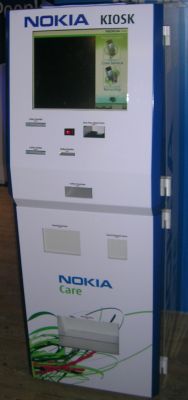Nokia kiosks collect phones for recycling

MALAYSIA--Nokia has introduced automated kiosks across the central Klang Valley in a bid to encourage people to recycle their mobile phones.
In a recent study conducted by the mobile phone maker, only 3 percent of respondents recycled their cell phones and 50 percent were unaware that their devices could be reused.
Nokia is hoping to improve the statistics with the introduction of kiosks specially designed to ease the recycling process.
 Integrated Nokia Kiosk |
"We've been at the forefront of driving environmental initiatives in the mobile industry for over a decade, and Nokia Malaysia is the first to launch this automated recycling machine within Nokia globally," Nellie Abdullah, Nokia Malaysia's environmental coordinator, said in an interview with ZDNet Asia.
The Integrated Nokia Kiosk (INK) is touted to be a first-of-its-kind kiosk that combines recycling and customer care services. As part of a six-month pilot program, the booths have been rolled out in four locations across central Klang Valley. Mobile users can drop off their old phones at the kiosks to be recycled, as well as leave their devices for servicing.
The process has been made easy for customers who only need to follow the instructions on the touch-screen machine, and drop off their devices or accessories accordingly for recycling or servicing, Nokia executives said.
Customer and phone details are collected at the INK to ensure speedy processing and better security for devices deposited into the kiosk, according to the company. Previously, customers would just drop off their unwanted phones in regular recycling bins at selected Nokia stores and outlets.
The Nokia study also determined that 44 percent of mobile users simply left their old devices unused at homes, while 4 percent of old devices were thrown into landfills. The survey polled some 6,500 people in 13 countries including China, India, and Germany.
"The new kiosks are part of our commitment to environmental responsibility, and one way in which we believe we can make it easier for people to recycle their used and unwanted mobiles," Nellie said.
"The survey revealed that one of the main reasons why so few people recycle their mobile phones is because they simply don't know that it is possible to do so," she said. "In fact, up to 80 percent of any Nokia device is recyclable. Materials such as cobalt, nickel, copper, iron, aluminum, plastics, and even gold can be recovered. It can be reused to help make new products such as steel and other metal products, plastic cones and in the case of precious metals like gold, into jewelry."
"If all of the 3 billion people globally [who own] mobiles brought back just one unused device, we could save 240,000 tonnes of raw materials and reduce greenhouse gases to the same effect as taking 4 million cars off the road," Nellie said. "By working together, small individual actions could add up to make a big difference."
As an added incentive for users to recycle their old mobile devices, Nokia will donate a tree for every phone recycled. This proposal is part of the existing NEWTrees Initiative, a collaboration between Nokia, WWF Indonesia and Equinox Publishing, in which Nokia pledged to plant 100,000 trees in Sebangau National Park in Central Kalimantan, Indonesia. The aim is to help reduce the annual haze that affects the region and contribute to protecting and preserving Sebangau.
Users who recycle their phones can monitor the growth of their trees, as Nokia will provide the coordinates of the tree planted and instructions on how to view the tree via Google Earth.
Lee Min Keong is a freelance IT writer based in Malaysia.